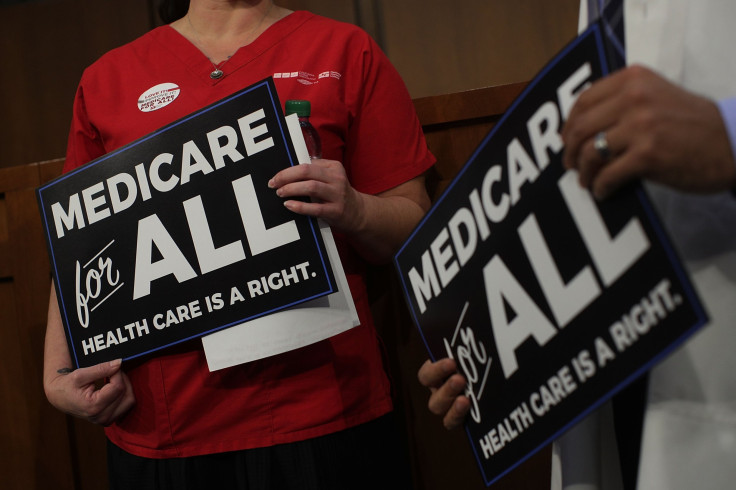What Is ‘Medicare For All’? Bernie Defends Single-Payer Healthcare Against Trump’s Attacks

Hours after President Donald Trump called “Medicare For All” a “curse” for the citizens of the United States on Thursday, Sen. Bernie Sanders (I-Vermont) spoke up against Trump's attacks against the single-payer healthcare system on Twitter.
No Mr. President, providing health care to every man, woman and child as a right is not a curse, it's exactly what we should be doing. https://t.co/sNeq6YZHDw
— Bernie Sanders (@SenSanders) September 14, 2017
Sanders’ website, which provides information on “Medicare For All”, explains it as the natural next step for a healthcare plan in the United States after former President Barack Obama introduced the Affordable Care Act in 2010. “Thanks to the ACA, more than 17 million Americans have gained health insurance. Millions of low-income Americans have coverage through expanded eligibility for Medicaid that now exists in 31 states. Young adults can stay on their parents’ health plans until they’re 26… But as we move forward, we must build upon the success of the ACA to achieve the goal of universal health care,” the website reads.
Under the proposed plan, every single U.S. citizen would be entitled to medically necessary services, which would include doctor, hospital, preventive, long-term care, mental health, reproductive health care, dental, vision, prescription drug and medical supply costs. A single public or quasi-public non-profit agency would be appointed to handle the funding and finances required to manage universal healthcare, but the delivery of the healthcare remains in private hands, according to Physicians For A National Heath Program.
Also, middle-class families would be able to save over $5,000 on Medicare as they no longer have to worry about healthcare premium draining their income.
According to a poll conducted by the Morning Consult and Politico in April, 44 percent of Americans are in favor of receiving “their health insurance from one government plan,” while 36 percent objected to it. In addition, leading democrats such as Sens. Kamala Harris (D-California), Elizabeth Warren (D-Massachusetts), Cory Booker (D-New Jersey), and Kirsten Gillibrand (D-New York) have come out in support of the plan.
In countries like Canada, Spain, and Australia, a universal healthcare system is followed, although the care itself is still provided by public or private organizations. The United Kingdom has also adapted a similar version of the plan that allows people to purchase additional healthcare benefits if they wish to, outside of the state-managed program.
Businessman Warren Buffett, the second wealthiest American in the country, has voiced his support for “Medicare For All.” "We are such a rich country. In a sense, we can afford to do it," Buffett told PBS NewsHour. "In almost every field of American business, it pays to bring down costs."
However, there are a number of limitations to Sanders’ proposal, which is why it is not likely to win over the Republicans on the other side of the political aisle. For starters, it does not provide an estimate of what the plan would cost the federal government, hence there is no way of calculating exactly how much money would be deducted from an average American’s wallet when it comes to taxes, CNBC reported.
Secondly, it would put the employer-based healthcare system in complete disarray, the Guardian reported. Lastly, coming up with a strategy to get the House of Representatives (which is not controlled by the Democrats) to pass the bill would be a herculean task.
The state of Colorado rejected a ballot that proposed to implement a single-payer healthcare system, Amendment 69, last year. Even though the plan in question was poorly thought out and not as detailed as Sanders’ “Medicare For All,” the core concept was similar.
© Copyright IBTimes 2024. All rights reserved.






















